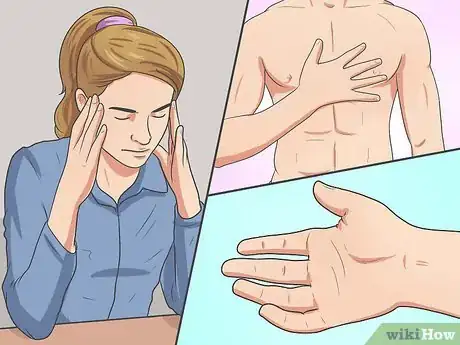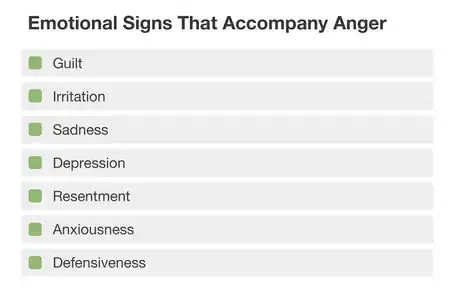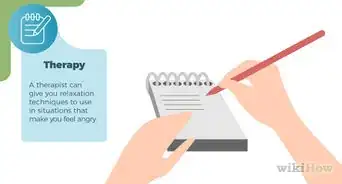This article was co-authored by Nicole Moshfegh, PsyD. Dr. Nicole Moshfegh is a Licensed Clinical Psychologist and Author based in Los Angeles, California. Dr. Moshfegh specializes in multicultural competence and treating patients with mood and anxiety disorders and insomnia. She holds a BA in Psychology and Social Behavior from The University of California, Irvine (UCI), and an MA and Doctor of Psychology (PsyD) from Pepperdine University. Dr. Moshfegh completed her predoctoral internship and postdoctoral fellowship at The University of California, Los Angeles (UCLA). Additionally, she is a member of the American Psychological Association, National Register of Health Service Psychologists, Los Angeles County Psychological Association, and Collaborative Family Healthcare Association. Dr. Moshfegh is also the best-selling author of "The Book of Sleep: 75 Strategies to Relieve Insomnia".
There are 13 references cited in this article, which can be found at the bottom of the page.
wikiHow marks an article as reader-approved once it receives enough positive feedback. In this case, 100% of readers who voted found the article helpful, earning it our reader-approved status.
This article has been viewed 288,180 times.
Everybody gets angry sometimes, but that doesn't mean you have to lose your cool. There are ways to handle your anger that are much healthier, and maybe even productive. In fact, the American Psychological Association says that when you handle it properly, there can be positives to anger, so it's really worth learning to relearn how you handle this emotion![1] Luckily, we have the tips you need to work towards a calmer life.
Steps
Taking Immediate Steps to Restrain Your Outburst
-
1Take notice of physical signs. When your body goes into stress mode, you will likely start to experience certain physical signs. These might include:
- Your jaws are clenched and your muscles tense.
- Your head or stomach hurts.
- Your heart starts racing.
- You sweat (even the palms of your hands are sweaty).
- Your face flushes.
- Your body or your hands shake.
- You get dizzy.
-
2Take notice of emotional signs. Anger is often accompanied by a flood of other emotions. After all, the amygdala, the center for emotions, is pumping out signals with all its might to meet a threat and ensure your survival. It isn't surprising that you can get a flood of other related emotions. These emotions are capable of sounding the alarms for the fight and flight response. In addition to anger, some emotions you might feel include:
- Irritation
- Sadness
- Depression
- Guilt
- Resentment
- Anxiousness
- Defensiveness
Advertisement -
3Count to ten. If you feel yourself getting angry and are experiencing the symptoms of anger listed above, you can tell yourself that you don't have to react right away. Counting can help you put off your feelings for the moment. It might feel a bit silly at first, but counting really can distract your long enough to calm down. Hold off on reacting and give yourself time to sort out your feelings.
-
4Try deep breathing. Try to get some space to yourself for a bit. If you can, excuse yourself and go to the bathroom, a stairwell, or outside while you do this, and this will help you feel comfortable deep breathing to calm down.[2]
- Mindfulness allows you to slow down instead of reacting quickly.[3]
- Breathe in for a count of four, hold for a count of four, and exhale for a count of four.
- Make sure you are breathing with your diaphragm rather than with your chest. When you breathe with your diaphragm, your belly extends out (you can feel it with your hand).
- Do this as many times as necessary until you start feeling calmer.
-
5Repeat a calming word or phrase. Try saying something calming to yourself, such as, “Calm down,” or “Relax,” or “Take it easy.” Repeat this phrase over and over until you feel your anger start to dissipate.[4]
-
6Get a change of scenery. If you feel your blood boil, get out. Take a walk. Breathe deeply. If you are able to remove yourself from the situation, do it. By not having the thing or person that makes you mad in front of you, you can more easily calm down.
-
7Try progressive muscle relaxation.[5] Progressive muscle relaxation is the process of tensing and relaxing your entire body in progressive stages. It is thought that by tensing your muscles yourself, you can release pent-up tension in your body. Here is an overview of this method:
- Breathe in for a count of four, hold for four, exhale for four. Keep breathing deeply.
- Start with the muscles in your head and face. Tighten as many muscles as you can in your face, head, mouth, and neck, and hold for twenty seconds, then release.
- Then work your way down the body, tensing and releasing your shoulders, arms, back (only if you don't have back problems), hands, stomach, legs, feet, and toes.
- Now wiggle your toes around, feeling the relaxation from your toes to your head.
- Take a few more deep breaths, and enjoy the feeling of relaxation.
-
8Find something humorous to enjoy. If you can get yourself laughing, you can change the chemical reaction in your body. You can use your brain and imagination to create all sorts of ridiculous situations that can get you laughing, especially if it isn't mean-spirited or sarcastic humor.
- For instance, say you're in a situation where your boss got mad at you about something. Instead of fuming about it at your desk, you can dissipate your own anger by imagining he has a fish head and he was yelling through his fish mouth. It is important, however, not to laugh or smirk if you're still in a conversation with your boss. This could make things worse.
- You can even use this method if you lose your temper a lot. Using something to make you laugh will help you calm down for this moment. Then you can more effectively employ other methods, such as problem solving, to come up with a solution to the situation you're facing.
Identifying the Causes of Your Anger
-
1Examine what else is happening in your life. We might feel angry when we have a lack of control, whether it's physical or emotional. These common occurrences all have the potential to raise ire in people:[6]
- Physical discomforts: Feeling tired, hungry or in pain can make people angry and cranky.
- Going through the grieving process: Anger is a part of the grieving process.
- Dissatisfaction with your sex life, or your spouse is cheating on you.
- Other people's inconsiderate or rude behavior.
- Dealing with addiction and withdrawal
- Medical reasons such as hormone fluctuations and illnesses.
- Having a mental disorder: Anger can be part of the symptoms for many disorders.
- Being in an unjust situation, such as being under the regime of an oppressive government, or being subjected to discrimination.
- Being subjected to abusive situations, such as being bullied or humiliated.
- Stress from the daily grind, such as meeting deadlines, putting up with traffic, dealing with disappointing outcomes, or not meeting one's goals or expectations.
- Loss of money or income, such as getting robbed or having money problems.
-
2Rate your anger. Rating your anger can help you realize what type of events make you angry and the degree they make you angry. Some events might cause mild irritation, while others might trigger you wanting to blow your top. You don't really need an official anger scale. You can make your own, for instance, on a scale of one to ten, or zero to 100. You can use what works with you.[7]
- Track how often your anger spikes by writing down your anger rating in a journal.
-
3Keep an anger journal. An anger journal will help you keep track of what events anger you and the degree to which they anger you. You should also track the surrounding events and environments that preceded your anger or occurred during your anger. Take note of how you react when you're angry, and the reactions of other people when you get angry.[8] When you record in your journal, you can make the following observations:
- What provoked the anger?
- Rate your anger.
- What thoughts occurred as you got angry?
- How did you react? How did others react to you?
- What was your mood right before it happened?
- What symptoms of anger did you feel in your body?
- Did you want to leave, or did you want to act out, such as bang the door or hit something or someone, or did you say something sarcastic?
- What were your emotions immediately after the incident?
- What were your feelings a few hours after the episode?
- Was the episode resolved?
- Keeping track of this information will help you learn what situations and triggers your anger. Then, you can avoid those situations when possible. Or, you can predict when these situations may occur if they are unavoidable.
-
4Identify your anger triggers. A trigger is something that happens or that you experience that brings on an emotion or a memory. Some common triggers for anger are:
- Not being able to control other people's actions.
- Other people disappointing you for not meeting your expectations.
- Not being able to control daily life events, such as traffic or things that get in the way of your progress.
- Someone trying to manipulate you or take advantage of you.
- Getting mad at yourself for a mistake.
- Being hungry, tired or stressed.
Developing Strategies for Handling Anger
-
1Make an anger management plan. Following a plan will help you gain control over your anger at the moment. The key is to gain control of your body's response first. Once you do this, you can work out what is bothering you and why. When you understand this, you can assertively express yourself to make sure you are expressing your anger in a productive way. It takes lots of practice and patience to deal with your feelings in a new, constructive way.
- Have a specific set of actions in mind for when you feel angry. For example, once you recognize that you are feeling angry, step outside for five minutes. Take some deep breaths and repeat a calming phrase to yourself. This process will help you defuse your anger.
-
2Avoid "all or nothing" thinking. When a person is angry, he may tend to think, “Everything's ruined,” or “I'll never be able to do that.” This type of thinking reduces things to an all-or-nothing scenario because the person thinks that the problem is the end of the world. Avoid words and phrases that put situations in absolute terms. Stop framing things with “always” or “never.”[9]
- Instead, think to yourself: “This situation is frustrating, but it's not the end of the world.”
-
3Avoid situations that make you angry. Oftentimes, you can avoid angry outbursts by avoiding the situation that makes you angry. For example, if you know that you get angry at the morning traffic, try to leave at a different time, or take public transit. If you know you get angry because you skipped lunch, be diligent about eating properly.
-
4Let go of grudges. When you harbor resentment against someone, your anger will only continue and become hard to control. Accept others for who they are. Focus on how you handle a situation, rather than how someone else handles it. Letting go of grudges will help you refocus your energy on more positive things.[10]
-
5Try exercising. Exercise can help dissipate anger. For adults and children, research shows that exercise helps with mood regulation and controlling emotions. Try exercising when you're in a mad moment, or use it daily to release aggression.
-
6Reset your emotions with a good night's sleep. Getting a good night's sleep helps people regulate their emotions. Emotions are harder to control when we don't get enough sleep. One study showed that with only a few nights of disrupted sleep for teenage girls, their negative feelings increased as well as their anger.
- If you are having trouble sleeping on a consistent basis, you should see your doctor.
-
7Try meditation. Meditation has been shown to be effective in emotional regulation. It has a longer lasting effect on the amygdala, the center for emotion and the part of the brain where the stress response begins after a stressful or threatening event has been perceived. Start with deep breathing. You can also combine breathing with visualization tasks. Try this visualization exercise:
- When you breathe in, envision a golden-white light that relaxes you and makes you feel happy. Envision this white light spreading into your lungs and throughout your entire body. When you breathe out, breathe out muddy, dark colors which represent your angry, stressed out feelings.
- If you feel like you have trouble meditating, don't worry. Meditation is a combination of deep breathing exercises, visualization, and performing mental tasks. But if you feel like it's difficult for you to sit long enough to meditate, or if you feel uncomfortable meditating, you can just begin with simply deep breathing. This will still initiate your body's calming response.
-
8Don't get discouraged if you relapse. When people try something new, it doesn't always go perfectly.[11] This can be true when you're learning new ways to deal with anger. The best way to deal with relapses in exploding with anger or reacting passive-aggressively is to look at what didn't work. It's part of the learning process. When you are able to look at what didn't work, you can adjust what you do for that anger trigger for the next time.
- Most of all, hang in there! Be happy for your smallest accomplishments, because each one of them is a step towards accomplishing your bigger goal, which is dealing with anger.
Expressing Anger in a Healthy Way
-
1Focus on communicating assertively. Assertive communication emphasizes that both people in a conversation have important needs. To communicate assertively, give the facts without making accusations. [12]
- For example, you might say: “I was hurt and angry because it seems like you were belittling my project when you laughed during my presentation. I don't know what was going on, but it seems like you weren't paying attention or taking my hard work seriously. I could have just misunderstood what was going on. Can we talk and work this out?”
-
2Be respectful. Using please and thank you is not only polite, but it also shows respect for other people. Your communications should convey requests rather than demands. In order to get respect, you have to give it. Then you will foster cooperation and reciprocal respect. This is the opposite of what happens with anger, where aggressive, passive, or passive-aggressive communications puts others at odds with you.[13]
- You can start your communications this way: “When you have the time, could you…” or “It would be a great help if you… Thanks, I appreciate it!”
-
3Make communications clear. If you hem and haw and beat around the bush, or make general statements that are not specific, everyone involved will get frustrated. Instead, directly address the person you need to resolve your issue with. Make it clear what you would like to see happen. Be sure to put it in the form of a request.[14]
- For instance, if your coworker is speaking very loudly on the phone and it's difficult for you to do your work, you can state your request like this: “I have a request. Would you please lower the volume of your voice on the telephone? It's making it very difficult to concentrate on my work. I'd really appreciate it. Thanks.”
- If you had stated instead, “It's really difficult to get my work done with all the noise in this office” to everyone in the room, it's not specific. Moreover, it will most likely alienate all of your coworkers, and you probably won't get your problem solved.
-
4Express your feelings well. When you figure out how you're feeling, convey the real feeling, like hurt, and keep judgment statements out of it.[15]
- For example, this is not an assertive way to express yourself: “I feel that you are an insensitive bore.” That is a judgment against another person (and not a very nice one at that).
- Instead, stick to things that pertain to you: “I feel that you are not being sensitive to my feelings when you read your paper instead of listening to what I'm trying to say.”
-
5Aim for problem solving. Once you are able to recognize your anger triggers, you can slow down your anger and address anger-provoking thoughts. Then you will be able to shift your focus to problem solving. With problem solving, you are doing everything in your power to address the problem, figure out your own feelings regarding the situation, and express your feelings in the most productive way possible.
- For example, you might get angry because your child got bad grades on his report card. To avoid having an angry outburst at your child, you should try to problem-solve. This will help you process through the situation.
- Work through your emotions by taking a few minutes to yourself, breathing deeply. As your head clears a bit, you can start thinking of solutions to this problem. You can strategize how you will talk to your child about his grades, emphasizing that you love him and support him. You can also think of solutions, such as getting him a tutor or enrolling him in a study skills class.
- You might have to accept the fact that sometimes, there isn't a solution to the problem at hand. This is okay, because not everything in life can be tied up in a package with a neat little bow. Life's a lot messier than that. You can't control life, but you can control how you react towards it.
Getting Professional Help
-
1Enroll in an anger management program. Fortunately, anger management programs have been shown to have a high rate of success. The most successful programs help you understand your anger, give you short-term strategies to deal with your anger, and help you build skills.[16]
- There are a wide variety of options for anger management programs.[17] For example, there are anger management programs available for teens, executives, police officers, and other populations of people who might be experiencing different types of anger for different reasons.
-
2Try therapy. Therapy is a great way to find new ways of dealing and expressing anger.[18] You can take your anger journal, for instance, and bring it to therapy with you.[19]
- Your therapist will most likely use relaxation techniques to help you calm down in the middle of an anger episode. Your therapist will also help you deal with the thoughts that can trigger anger and find new ways to view your situations. Therapists will also help you with emotional coping skills and assertiveness communication training.
- You may choose to see a psychotherapist who specializes in a person's history to resolve problems today, such as overcoming an abusive or neglectful childhood, or overcoming a tragic event. This can be very helpful in dealing with anger from past events.
- Find a therapist in your area by using the American Psychological Association's Psychologist Locator.
-
3Ask your doctor about medication. Anger is often part of a different disorder, such as bipolar disorder, depression, or anxiety. Drug therapy for anger will depend on the condition with which the anger is occurring. Taking the medications for the disorder could help the anger as well.[20]
- For example, if the anger is occurring with depression, anger could be treated along with other depression symptoms with antidepressants. If irritability is occurring as a part of generalized anxiety disorder, selective serotonin reuptake inhibitors (SSRIs) such as Lexapro or Prozac might be used to treat the disorder. In the meantime, these drugs can help with your irritability.
- Each drug has side effects. For example, lithium is used to treat bipolar disorder. It has a very high rate of renal (kidney) complications. Being aware of the possible side effects will help you monitor for complications. It's very important to discuss these possibilities openly with your doctor.
- Be sure to talk about any addiction problems you have with your doctor. The last thing you need when you are struggling with alcohol, for instance, is to add another addiction. This should be discussed candidly with your doctor to help her decide the best medication to treat your anger and any other symptoms you might be having.
References
- ↑ https://www.apa.org/topics/anger/recognize
- ↑ http://www.apa.org/helpcenter/controlling-anger.aspx
- ↑ Nicole Moshfegh, PsyD. Licensed Clinical Psychologist. Expert Interview. 5 August 2021.
- ↑ http://www.apa.org/helpcenter/controlling-anger.aspx
- ↑ Nicole Moshfegh, PsyD. Licensed Clinical Psychologist. Expert Interview. 5 August 2021.
- ↑ http://www.medicalnewstoday.com/articles/162035.php
- ↑ https://www.mentalhelp.net/articles/rage-ratings/
- ↑ https://www.mentalhelp.net/articles/anger-diary-and-triggers/
- ↑ http://www.medicalnewstoday.com/articles/162035.php
- ↑ http://www.medicalnewstoday.com/articles/162035.php
- ↑ https://www.mentalhelp.net/articles/handling-anger-management-relapses/
- ↑ https://www.mentalhelp.net/articles/assertive-communication-and-anger-management/
- ↑ https://www.mentalhelp.net/articles/anger-management-and-making-requests/
- ↑ https://www.mentalhelp.net/articles/anger-management-and-making-requests/
- ↑ https://www.mentalhelp.net/articles/anger-management-and-making-requests/
- ↑ http://www.apa.org/helpcenter/recognize-anger.aspx
- ↑ http://www.psychguides.com/guides/anger-symptoms-causes-and-effects/o
- ↑ Nicole Moshfegh, PsyD. Licensed Clinical Psychologist. Expert Interview. 5 August 2021.
- ↑ http://www.apa.org/topics/anger/help.aspx
- ↑ http://www.psychguides.com/guides/anger-symptoms-causes-and-effects/
About This Article
If you’re having trouble restraining yourself from an outburst, excuse yourself from the situation if you are able to. If you can’t leave, count to 10 and take several deep, calming breaths before you say or do anything. Try repeating a phrase like, “Relax” or, “Calm down” to yourself until you feel your anger start to fade. If that doesn’t work, try to think of something lighthearted and silly that makes you laugh. Read on for tips from our counseling reviewer on how having an anger management plan can help you avoid an outburst!




























































































Medical Disclaimer
The content of this article is not intended to be a substitute for professional medical advice, examination, diagnosis, or treatment. You should always contact your doctor or other qualified healthcare professional before starting, changing, or stopping any kind of health treatment.
Read More...